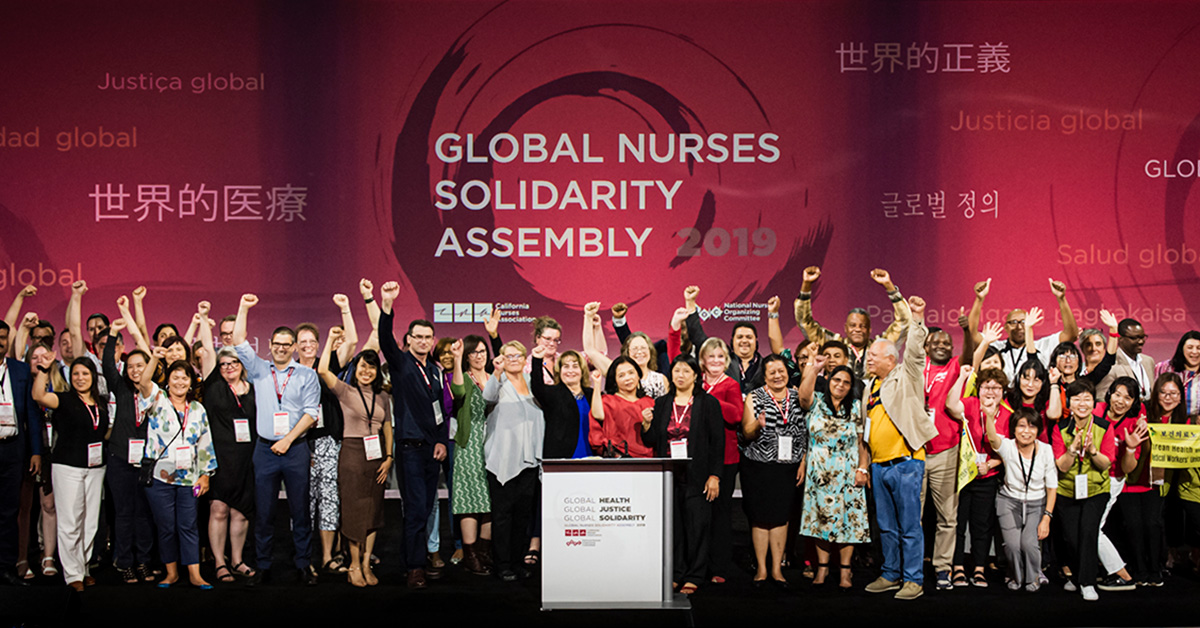A Whole New World

At the 2019 Global Nurses Solidarity Assembly, RNs and allies from across the planet envision a society based on care, not profit.
By Kari Jones
National Nurse magazine - July | Aug | Sept 2019 Issue
“What would you say if I told you that Johns Hopkins — this prestigious, famous, illustrious hospital that made $85.4 million dollars last year — is so cheap, that it won’t even buy its nurses gloves that don’t rip?”
Shaneisha McMillan, a registered nurse at Johns Hopkins Hospital in Baltimore, Maryland, punctuated her question by waving a tattered glove in the air. She was addressing more than 1,500 nurse union leaders and allies from 25 countries at the 2019 Global Nurses Solidarity Assembly (GNSA), held in San Francisco Sept. 12–15. Her story of poor working conditions and the Hopkins nurses’ fight to unionize ignited the crowd.
“It was shocking to learn the real face of Johns Hopkins Hospital, because we always thought it was the number one hospital around the globe,” said Sun Ja Na, RN, president of the Korean Health and Medical Workers Union (KHMU). “But then we realized it was number one in terms of oppression and the need for change. We could relate because in Korea, the largest hospital is Samsung, and it does not have a union.”
With inspiration from McMillan’s story, Na said she realized, “We need to make more effort to unionize Samsung hospital!”
This fire kindled between the Hopkins nurses and the South Korean nurses is just one of countless global connections and galvanizing moments that happened at the global assembly, filled with panel discussions, educational sessions, revolutionary art and theater, and an epic nurses’ march for health care justice that shut down the streets of San Francisco.
“We nurses have front row seats to the massive inequality and health care needs of our communities,” said California Nurses Association/National Nurses Organizing Committee (CNA/NNOC) President Malinda Markowitz, RN. “But you know what? Nurses are people who get things done and who don’t give up. I firmly believe that, collectively, we have the ability to change the world.”
The Global Nurses Solidarity Assembly was hosted by CNA/NNOC, an affiliate of National Nurses United. In 2013, NNU and its affiliates joined forces with union affiliates from 14 other nations to form Global Nurses United (GNU). Today, GNU encompasses union affiliates from 28 countries — 25 of which were able to send representatives to the global assembly. A number of union leaders from Guatemala, India, Sri Lanka, and Malawi tried to attend but were denied visas by the U.S. State Department.
Much of the assembly focused on revealing and analyzing the political and economic global forces, led by transnational corporations and right-wing governments, that are putting the squeeze on working people to extract as much profit as possible from our labor, from our public resources, and from our planet. Conversely, nurses and allies shared their stories of organizing, of challenges, and of victories in their struggle for health care, social, economic, and racial justice.
Many of the assembly speakers praised nurses for their special role in society. “Your ability to connect people, through the work that you do and people’s trust in you, will continue to save lives,” said Zahra Billoo, executive director of the Council on American-Islamic Relations, San Francisco Bay Area office.
Indeed, many of the panelists encouraged nurses to conceptualize their caregiving work and mission as the antithesis of profit-seeking corporations and endeavors. “I call care work ‘the work of life,’” said Tithi Battacharya, an associate professor of South Asian history at Purdue University and author of Feminism for the 99%. “This life work is a prerequisite to building the rest of society.”
Noted author and activist Naomi Klein pointed out how caring for patients, caring for people is, in contrast to the fossil fuel industry, intrinsically sustainable for the planet. “Care work is climate work. Medicare for All is a climate justice issue. Taking care of one another is low carbon!” said Klein.
Their messages resonated with nurse attendees from across the world. “When you evaluate nursing internationally, there is no one like us,” said Julio César García Cruceta, secretary general of the National Nurses Union of the Dominican Republic, through an interpreter. Interpretation services in multiple languages, including Spanish, Portuguese, and Korean, was a first for this CNA/NNOC assembly and made communication and connection among the global nursing unions possible. “We are the most dynamic profession within the health care sector. We spend 24 hours a day, 365 days a year next to the patient. We need to have solidarity among ourselves. We need to be organized.”
Bonnie Castillo, RN and executive director of CNA/NNOC and National Nurses United, summed it up well. “As global nurses, our fights align in so many ways,” said Castillo during the opening plenary Friday. “The reason that we are united in common struggle is because nurses everywhere know that the dominant value system driving this world right now needs to change. We can envision a world that prioritizes public health and safety, public good, and the safety of the planet...We can build a world of nurses’ values.”